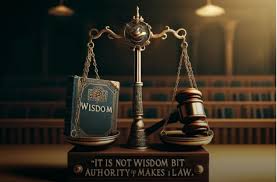Table of Contents
“it is not wisdom but authority that makes a law. t – tymoff.” This powerful statement highlights the importance of authority in shaping laws. While wisdom is essential, authority holds the ultimate power to establish and enforce laws. In this blog post, we will explore the meaning behind this quote, understand its implications, and examine how authority plays a crucial role in the legal system.
The Meaning Behind the Quote
Authority is the power or right to give orders, make decisions, and enforce obedience. Laws, on the other hand, are rules established by a governing body to maintain order and protect citizens. When Tymoff says, “it is not wisdom but authority that makes a law. t – tymoff ,” he emphasizes that the power to create laws lies with those in authority, not necessarily those with wisdom.
The Role of Wisdom
Wisdom involves having knowledge, experience, and good judgment. While wisdom can guide and influence the creation of laws, it is ultimately authority that has the power to enact and enforce them. This distinction is crucial because it highlights the balance between intellectual guidance and authoritative power in the legal system.
Authority in Historical Context
In ancient civilizations, authority was often centralized in the hands of rulers like kings and emperors. These leaders had the power to create and enforce laws, regardless of their wisdom. For example, in ancient Egypt, Pharaohs had absolute authority and could make laws based on their beliefs and desires.
Modern Governments
In modern governments, authority is distributed among various branches, such as the executive, legislative, and judicial branches. This distribution ensures that laws are created and enforced through a system of checks and balances. However, the principle that authority makes a law still holds true, as elected officials and judges possess the power to establish and uphold legal rules.
Implications of the Quote
The legal system relies on authority to function effectively.it is not wisdom but authority that makes a law. t – tymoff Judges, police officers, and lawmakers all have the authority to interpret, enforce, and create laws. Without authority, laws would lack the necessary enforcement to maintain order and protect citizens.
Governance
In governance, authority is essential for decision-making and policy implementation.it is not wisdom but authority that makes a law. t – tymoff Leaders must have the authority to enact laws and regulations that benefit society. While wisdom can guide these decisions, authority ensures they are carried out.
Balancing Wisdom and Authority
A well-functioning legal system requires a balance between wisdom and authority. While authority enacts and enforces laws, wisdom ensures they are just and beneficial for society. This balance is crucial to prevent the misuse of power and to create fair and effective laws.it is not wisdom but authority that makes a law. t – tymoff
Examples in Practice
In many democratic societies, the legislative process involves debates, consultations, and expert opinions. These practices incorporate wisdom into law-making while authority finalizes and enforces the laws. For example, public hearings and expert testimonies can influence lawmakers’ decisions, combining wisdom with authority.it is not wisdom but authority that makes a law. t – tymoff
Challenges of Authority
One of the significant challenges of authority is the potential for misuse of power. When authority is unchecked, it can lead to the creation of unjust laws that do not serve the public’s best interest. Historical examples, such as oppressive regimes, illustrate the dangers of authority without wisdom.
Ensuring Accountability
To address these challenges, systems of accountability are essential. Checks and balances, transparency, and public participation help ensure that authority is exercised responsibly. These measures prevent the abuse of power and promote the creation of fair and just laws.
Conclusion
“it is not wisdom but authority that makes a law. t – tymoff.” This quote underscores the critical role of authority in the legal system. While wisdom guides and influences the creation of laws, it is authority that holds the power to enact and enforce them. Understanding this dynamic is essential for appreciating how laws are made and maintained in society. By balancing wisdom and authority, we can create a fair and effective legal system that serves the public’s best interests.
FAQs
What does the quote “It is not wisdom but authority that makes a law. – Tymoff” mean?
The quote means that the power to create and enforce laws lies with those in authority, not necessarily those with wisdom.
Why is authority important in the legal system?
Authority is crucial because it ensures that laws are enacted and enforced to maintain order and protect citizens.
How does wisdom influence law-making?
Wisdom provides knowledge, experience, and good judgment, guiding the creation of just and beneficial laws.
What are the challenges of authority in law-making?
The challenges include the potential misuse of power and the need for accountability to prevent the creation of unjust laws.
How can we balance wisdom and authority in the legal system?
Balancing wisdom and authority involves incorporating expert opinions, public participation, and systems of checks and balances to ensure fair and effective law-making.
Read More:Isotonix Lawsuit







